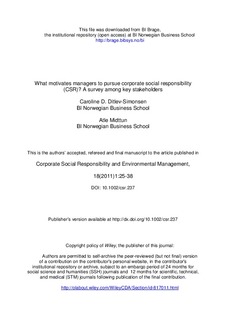| dc.contributor.author | Ditlev-Simonsen, Caroline D. | |
| dc.contributor.author | Midttun, Atle | |
| dc.date.accessioned | 2015-07-21T12:28:32Z | |
| dc.date.available | 2015-07-21T12:28:32Z | |
| dc.date.issued | 2011 | |
| dc.identifier.citation | Corporate Social Responsibility and Environmental Management, 18(2011)1:25-38 | nb_NO |
| dc.identifier.issn | 1535-3966 | |
| dc.identifier.issn | 1535-3958 | |
| dc.identifier.uri | http://hdl.handle.net/11250/293433 | |
| dc.description | This is the authors' accepted and refereed manuscript to the article | nb_NO |
| dc.description.abstract | Following several decades of scholarship with several disciplinary points of departure, there is today a great heterogeneity of theories and approaches to Corporate Social Responsibility (CSR). Taking a pragmatist position this article takes some of the most central theoretic perspectives on CSR and exposes them to an evaluation by three panels: Corporate leaders, NGO employees and master students at business school. The purpose of the paper is to clarify and compare what these panels think motivate mangers to pursue CSR from a positivist and normative perspective.
We find that the three panels are surprisingly agreed on what they assume motivate managers to pursue CSR and what should motivate the same mangers. We also see a large discrepancy between what they think motivate and what should motivate managers. Branding, stakeholders and value maximization are assumed to be key motivators, whereas sustainability and branding should be the key motivators. | nb_NO |
| dc.language.iso | eng | nb_NO |
| dc.publisher | Wiley | nb_NO |
| dc.title | What motivates managers to pursue corporate social responsibility (CSR)? A survey among key stakeholders | nb_NO |
| dc.type | Journal article | nb_NO |
| dc.type | Peer reviewed | nb_NO |
| dc.source.journal | Corporate Social Responsibility and Environmental Management | nb_NO |
| dc.identifier.doi | 10.1002/csr.237 | |
| dc.description.localcode | 1, Forfatterversjon | nb_NO |
